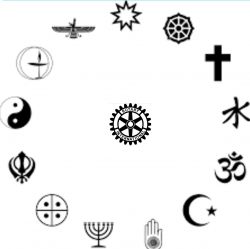 Last Week
Last WeekGeoff Green gave us a very interesting talk about food and the small urban vegetable gardens with which he is involved. Outside his small urban farm he mentors potential growers and has a network of over 400 vegetable gardens primarily in the townships and informal settlements.
He has a flock of Rhode Island Reds for egg production that was funded by the Rotary Club of Oslo and possible cooperation with them will be discussed at the Club Assembly on Saturday.
There was much interest in his talk and there was a general request that he come back and chat to us about establishing establishing similar bio-dynamic vegetable gardens at our own homes. We are looking at a date.
Club Assembly Captain Room @ Wanderers, 9,30 Saturday 30th July
The agenda has been drawn up and I am just waiting for confirmation from Lyn Collocott that I haven't missed anything out!
This assembly will set the club's direction for at least the next six months so it is very important that you do your best to attend and provide input.
I have added a number of items to the agenda that have been requested by members. If you have anything specific that you wish to discuss please let me know.
Something that will come up is the issue of Job Creation. It's one thing that has been raised by Vocational Service and is something we must seriously look at.
After the assembly we will know what we are going to do this year and you will receive a form asking which committee you wish to be on. As you know, everyone in the club has to be on a committee but the assembly will enable you to choose your committee so that you are involved with a particular project that appeals to you personally.
This Week
David Bradshaw is going to chat about his Rotary Friendship Exchange to Nigeria. This should be very interesting as he has put a Nigerian suggestion on the agenda for the club assembly.
MEMBER INTERVIEW: SUSAN DAVIS USES SOCIAL ENTREPRENEURSHIP TO FIGHT POVERTY
Susan Davis has devoted the past three decades to using social entrepreneurship and microfinance to address extreme poverty, particularly in Bangladesh. A Rotary Foundation Ambassadorial Scholarship in the early 1980s allowed her to study international relations at the University of Oxford. A decade ago, she co-founded BRAC USA (previously the Bangladesh Rehabilitation Assistance Committee) to help the world’s poor through self-empowerment. She is co-author, with journalist David Bornstein, of the book Social Entrepreneurship: What Everyone Needs to Know, and has served on numerous boards, including the United Nations Fund for International Partnerships and the Grameen Foundation. At the Rotary International Convention in May, Davis, who is a member of the Rotary E-Club of District 7210, received the 2015-16 Rotary Global Alumni Service to Humanity Award.
THE ROTARIAN: How did your Rotary Foundation Ambassadorial Scholarship influence your career?
DAVIS: Getting a chance to study at Oxford through the great gift of the Rotary scholarship was eye-opening. It’s one of the oldest universities in the world and a tremendous place to get perspective on international relations and politics. Without that scholarship, who knows what I would have done. It was the first time I had lived outside the country, and it helped to shape my deep sense of commitment to being a good global citizen and being of service. And I’m so touched to be honored by Rotary when I feel that it has already given me so much through the scholarship.
TR: Your time in Bangladesh, specifically when you first went in the mid-1980s for the Ford Foundation, was also life-changing. What did you see there and how did it affect your approach to addressing poverty?
DAVIS: Microfinance and social entrepreneurship were the best strategies I saw to respond to the daily question from women of, “How do I feed my family today?” I had never met people who hadn’t eaten something for days, so when I was confronted with extreme poverty – women who would feed their family grass or make mud cakes to fill their bellies – it’s extremely urgent. Microfinance as a solution, because it’s potentially sustainable, became a passion of mine. It empowers people to change their lives and their communities.
TR: Last year you left your post as president and chief executive officer at BRAC USA, and previously you served on the Grameen board, where you were chair when Muhammad Yunus and Grameen Bank won the 2006 Nobel Peace Prize. What are you focusing your attention on now?
DAVIS: I will turn 60 in November, so I decided it was important to see what it feels like to pull back and reflect. I’ll continue to try to be of service, and support young people especially, through my work with New York University and Columbia coaching and teaching social entrepreneurship. I’m also studying racism, looking into other social justice movements, and thinking about gender liberation. I still serve on several boards, including a start-up board called Learn With All, which is a technology company focused on the joy of learning. I’m still working to end extreme poverty and am involved in the Rotarian Action Group for Microfinance and Community Development. If I hadn’t had these experiences of seeing women slowly starving perhaps I wouldn’t feel as strongly, but I know we are rich enough and smart enough to end extreme poverty and hunger. It’s just a matter of political will.













